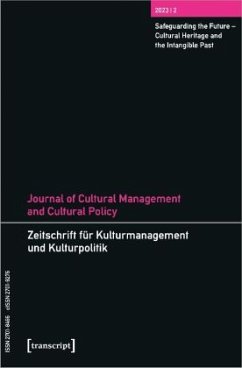The Journal of Cultural Management and Cultural Policy offers international perspectives on a wide range of issues in cultural management and cultural policy research and practice.
Intangible cultural heritage refers to the practices, expressions, skills, knowledge, and cultural spaces that cultural communities use to represent, share, and pass down cultural identities. This issue explores the sustainability of intangible cultural heritage, increasingly at risk from contemporary, commercial, and political forces. With special focus on performing arts, the contributors cover issues pertaining to the intangible past including policies, management practices, juxtapositions of innovation and tradition, cultural integrity, cultural value, and relevant ethical questions.
Hinweis: Dieser Artikel kann nur an eine deutsche Lieferadresse ausgeliefert werden.
Intangible cultural heritage refers to the practices, expressions, skills, knowledge, and cultural spaces that cultural communities use to represent, share, and pass down cultural identities. This issue explores the sustainability of intangible cultural heritage, increasingly at risk from contemporary, commercial, and political forces. With special focus on performing arts, the contributors cover issues pertaining to the intangible past including policies, management practices, juxtapositions of innovation and tradition, cultural integrity, cultural value, and relevant ethical questions.
Hinweis: Dieser Artikel kann nur an eine deutsche Lieferadresse ausgeliefert werden.

